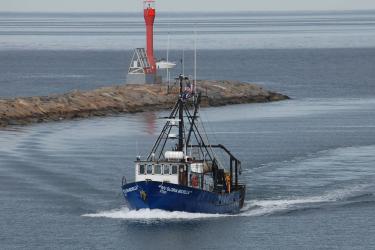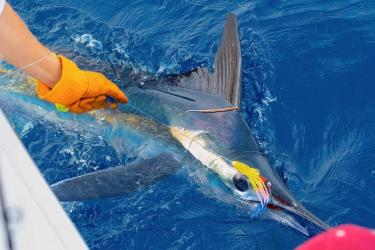Valerie Ouellet is a diadromous species scientist for the Northeast Fisheries Science Center’s Protected Species Branch. Her home base is at our Maine Field Station located in Orono, Maine.
Can you tell us a little about yourself—where you grew up, how you got interested in science, where you went to college?
I grew up on a farm in a small rural town called Padoue in Quebec, Canada. As far as I remember, I have always been interested in science. The farm provided plenty of opportunities to explore and learn. When my parents had enough of my inquisitive mind, I would go to the neighbors—a retired couple—and spend hours talking and asking them questions. I remember them telling me that some questions are best answered by slowing down and observing. We would quietly sit in the grass or in their amazing garden and study what the birds were doing. Although it was great advice, I wonder if it was also a way to get a few minutes of quiet time, haha!
When I was a kid, I wanted to be like Indiana Jones. That was until I realized what an archeologist's job entails. It’s not as adventurous as shown in the movies. Then I wanted to be an astronaut, volcanologist, marine biologist, or scientist like Jaques Cousteau and Jane Goodall. The list was long and I changed my mind many times until I started looking at freshwater ecosystems. I became absolutely fascinated by the idea of understanding how they are changing and how this is affecting aquatic species. This idea still gets me going today.
I earned my bachelor’s degree in biological sciences at Université de Montréal and my master's and doctoral degrees at INRS Eau Terre Environnement Research Centre in Quebec City, Canada. For my master’s degree, I looked at how fluctuating water levels in the St. Lawrence River impacted muskrat survival in the winter. For my doctoral degree, I developed computer models to understand how water temperature in the St. Lawrence River could impact fish habitat. The INRS was a great place to learn how fundamental science can support applied science and management, because there’s really strong collaboration between academics and government.
Why did you want to become a scientist?
I became a scientist because I wanted to understand how ecosystems are changing and how this is affecting aquatic species. I strive to find solutions to reduce our negative impacts on ecosystems and play an active role in conserving aquatic species and water resources. I want people to understand how vital these resources are!
What advice do you have for the next generation of women scientists about a career in fisheries and/or marine science?
Although there are real challenges for women in sciences, don't let that stop you. Remember there is always something to learn from a bad experience. Be bold! Go after opportunities that interest you. The worst that can happen is that it doesn’t work out. You still learned something and you can always try again!
Choosing the right mentors and coworkers is really important. You want mentors that will provide you with opportunities, help you be a better version of yourself, and celebrate your achievements. Surround yourself with people that are constructive and will help you create a positive and motivating environment. Even if nothing is perfect, finding that almost-perfect job that makes work fun and fulfilling is possible. Don't settle for less. Keep trying and looking—it will eventually come your way.
Lastly, remember we all make mistakes. Be kind to yourself and don't take yourself too seriously.
For more information, please contact Heather Soulen.




